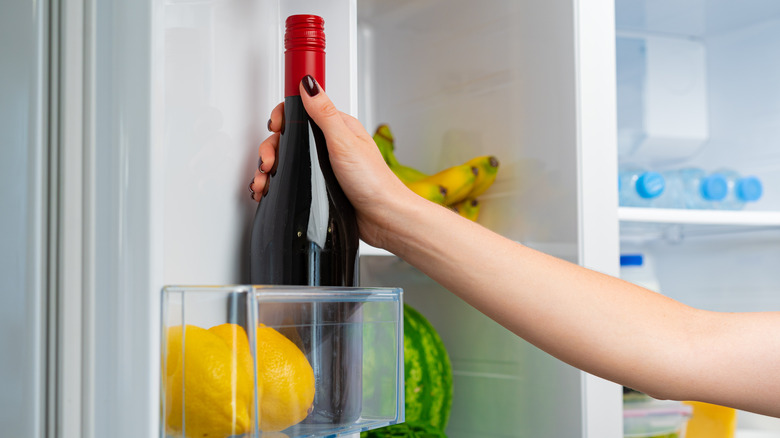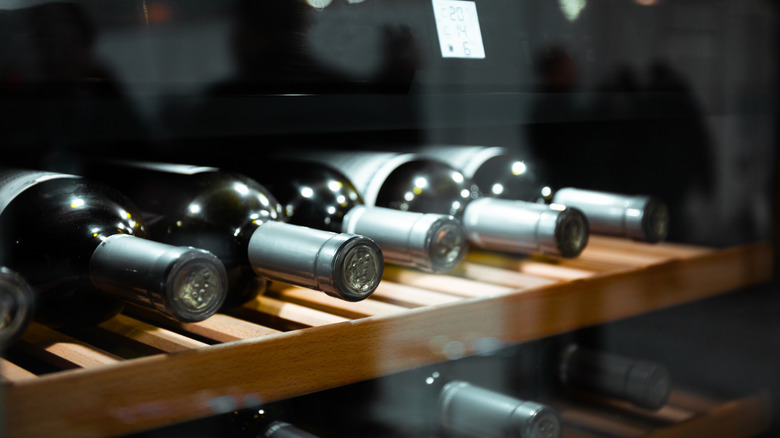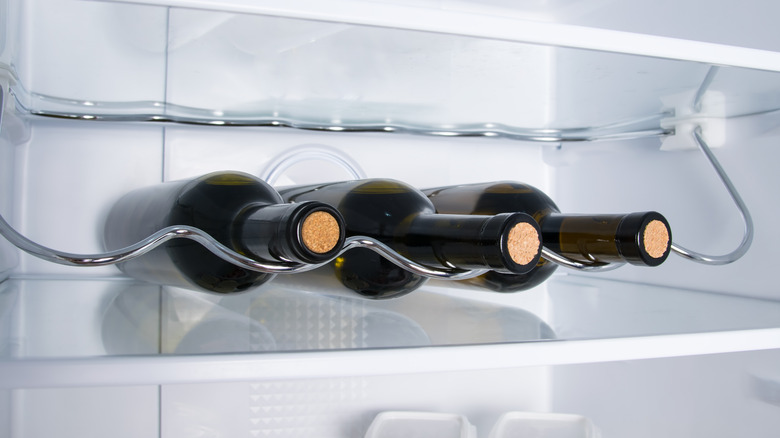Why You Shouldn't Store Wine In The Fridge Long Term
Have you ever popped a bottle of wine in the fridge for a dinner party or date night, only to neglect to open it? Maybe you forgot to bring it to your friend's place, or simply decided you didn't want a drink that night. Either way, you probably left the bottle in there until the next time you needed it. Perhaps you thought that, if taken back out of the fridge, the wine's flavor could wind up "skunked" — i.e., ruined — much like it happens with beer. (Not true.) Or you just didn't have room for the bottle in your pantry.
While keeping wine in the fridge for a short amount of time is fine, you should avoid doing it for a prolonged period of time. The cold temperatures in your fridge are simply not the optimal conditions for your bottle. You can shock your wine by chilling it, which may cause wine diamonds to form. These crystals, formed by tartaric acid, are considered by some to be a sign of quality wine, but they can add an unwanted texture and may be unpleasant to consume, as they do not re-dissolve into the wine. Additionally, the wine's balance of flavors will be compromised, an effect that only gets worse as the wine ages.
How to really store wine
The best way to store wine is in a cool, dark place, with the bottles arranged horizontally. You've probably noticed that wine racks are designed for horizontal storage, because maintaining contact between the cork and wine can prevent oxidation. Limiting oxidation is a crucial factor in maintaining and enhancing the flavors in a wine, and storing wine upright in your fridge can cause the cork to dry out, shrinking it and increase the chances of oxygen getting into the wine. Using a moderate temperature is also a must-do for several reasons.
Over-chilling your wine can detract from its aging potential. Many wines are designed to mature with age and develop more complex flavors, but they won't do so if kept at too low of a temperature. This is especially important to consider for collection bottles with long aging times expected. The bright lights inside a refrigerator can also have a negative effect on wine, as it causes unfavorable chemical reactions, and even the vibrations of your fridge can ruin a wine's flavor by agitating the sediment in the bottle. This is known as bottle shock, and can be reversed with time if the bottle is allowed to settle somewhere stable.
When to refrigerate wine
Though long term refrigeration isn't a great idea for wine, there are occasions when keeping your bottle in the fridge is recommended. Once opened, your wine should be stored in the fridge to prolong its shelf life. Cooler temperatures, which prevent wine from aging, also prevent it from deteriorating after it's been exposed to oxygen. Fortified wines like vermouth should also be stored in the refrigerator after opening. Even red wines are best stored in the fridge after opening, if you don't plan to drink the whole thing within a couple of days. (And there are plenty of red wines that benefit from chilling, perfect for enjoying in the warmer months.)
The real takeaway is that you shouldn't store unopened wine for any longer than it takes to give the bottle a slight chill. One last note: No matter what you do, you should never store wine in the freezer. Not only can it ruin the flavor of the wine, but you also risk your bottle shattering, since liquids expand in the freezer and put strain on glass contains. For quicker chilling, opt for an ice bath instead.



